The Public Life of Sherlock Holmes: The Case of the Inferior Sleuth (Doyle on Holmes)
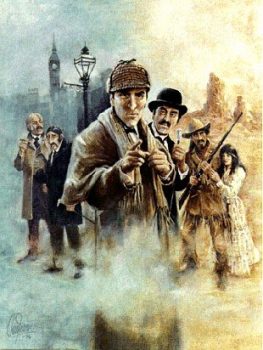
Welcome to week four of Doyle on Holmes. We started with The Truth Behind Sherlock Holmes. Then, it was Some Personalia about Sherlock Holmes. Last week, A Gaudy Death. This week, it’s a poem war featuring Sir Arthur! All four of these essays can be found in Peter Haining’s The Final Adventures of Sherlock Holmes. It’s a good book, and the only partial replacement I’ve found for Jack Tracy’s cornerstone book, Sherlock Holmes: The Published Apocrypha.
The Science of Deduction is the second chapter of A Study in Scarlet – the first Sherlock Holmes story. Holmes had explained the observations and inferences that had led to the famous line, “You have been in Afghanistan, I perceive.” Watson then – for the first, but certainly not the last, time – says it’s a simple matter. Watson then tells Holmes that he reminds him of Poe’s Dupin, and he didn’t know such existed in real life. Holmes sets him straight:
“Sherlock Holmes rose and lit his pipe. ‘No doubt you think that you are complimenting me in comparing me to Dupin,; he observed. ‘Now, in my opinion, Dupin was a very inferior fellow. That trick of his of breaking in on his friends’ thoughts with an apropos remark after a quarter of an hour’s silence is really very showy and superficial.
It’s Elementary – Bearing in mind this the very first story, having Holmes say that is pretty funny. Since he would do exactly that with Watson, more than once.
He had some analytical genius, no doubt; but he was by no means such a phenomenon as Poe appeared to imagine.’
‘Have you read Gaboriau’s works?’ I asked. ‘Does Lecoq come up to your idea of a detective?’
Sherlock Holmes sniffed sardonically. ‘Lecoq was a miserable bungler,’ he said in an angry voice; ‘he had only one thing to recommend him, and that was his energy. That book made me positively ill. The question was how to identify an unknown prisoner. I could have done it in twenty-four hours. Lecoq took six month, or so. It might be made a text-book for detectives to teach them what to avoid.’”
GUITERMAN TAKES OFFENSE
In 1915, the American poet and critic, Arthur Guiterman, included the following poem in his book, The Laughing Muse:
TO SIR ARTHUR CONAN DOYLE
By Arthur Guitermann
Gentle Sir Conan, I’ll venture that few have been
Half as prodigiously lucky as you have been.
Fortune, the flirt! has been wondrously kind to you,
Ever beneficent, sweet, and refined to you.
Doomed though you seemed – one might swear without perjury –
Doomed to the practice of physic and surgery,
Yet, growing weary of pills and physicianing,
Off to the Arctic you packed, expeditioning.
It’s Elementary – As a 20 year old medical student, Doyle signed on as ship’s surgeon for an Arctic whaling ship. The log he kept is available online.
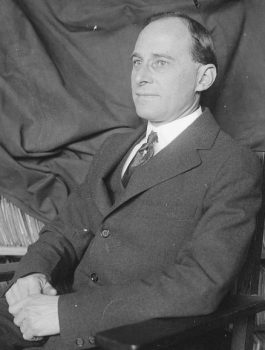 Roving and dreaming, Ambition and heady sin,
Roving and dreaming, Ambition and heady sin,
Gave you a spirit too restless for medicine;
That, I presume, as Romance is the quest of us,
Made you an Author – the same as the rest of us.
Ah, but the rest of us clamor distressfully,
‘How do you manage the game so successfully?
Tell us, disclose to us how under Heaven you
Squeeze from the inkpot so splendid a revenue!’
Then, when you’ve published your volume that vindicates
England’s South African raid (or the Syndicate’s),
Pleading that Britain’s extreme bellicosity
Wasn’t (as most of us think) an atrocity –
Straightway they gave you a cross with a chain to it –
(Oh what an honour! I could not attain to it,
Not if I lived to the age of Methusalem!) –
Made you a Knight of St. John of Jerusalem!
It’s Elementary – Doyle wrote The War in South Africa: Its Cause and Conduct, which was a propaganda piece defending Britain’s conduct in the Boer War, which was under severe criticism at home. He was knighted for the pamphlet.
It’s Still Elementary – It probably didn’t hurt that he had ‘sort of’ brought Holmes back with The Hound of the Baskervilles, the year before he was knighted.
Faith! As a teller of tales you’ve the trick with you!
Still there’ a bone I’ve been longing to pick with you:
Holmes is your hero of drama and serial;
All of us know where you dug the material
Whence he was moulded – ‘tis almost a platitude;
Yet your detective, in shameless ingratitude –
Sherlock your sleuthhound with motives ulterior
Sneers at Poe’s ‘Dupin’ as ‘very inferior!’
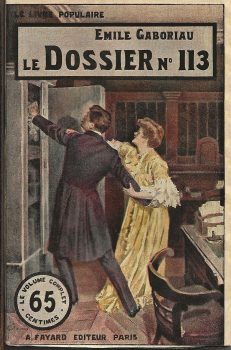 Labels Gaboriau’s clever ‘Lecoq’ indeed,
Labels Gaboriau’s clever ‘Lecoq’ indeed,
Merely ‘a bungler’, a creature to mock, indeed!
This, when your plots and your methods in story owe
More than a trifle to Poe and Gaboriau,
Sets all the Muses of Helicon sorrowing.
Borrow, Sir Knight, but be decent in borrowing!
Still, let us own that your bent is a cheery one,
Little you’ve written to bore or to wary one,
Plenty that’ slovenly, nothing with harm in it,
Much with abundance of vigor and charm in it.
Give me detectives with brains analytical
Rather than weaklings with morals mephitical –
Stories of battles and man’s intrepidity
Rather than wails of neurotic morbidity!
Give me adventures and fierce dinotheriums
Rather than Hewlett’s ecstatic deliriums!
Frankly Sir Conan, some hours I’ve eased with you
And, on the whole, I am pretty well pleased with you.
DOYLE LASHES BACK
It’s likely that Doyle wrote his response as soon as he read Guiterman’s poem. His blood surely ran hot immediately. It first appeared in 1924 in Lincoln Springfield’s reminiscences, Some Piquant People:
TO AN UNDISCERNING CRITIC
By A. Conan Doyle
Sure there are times when one cries with acidity,
‘Where are the limits of human stupidity?’
Here is a critic who says as a platitude
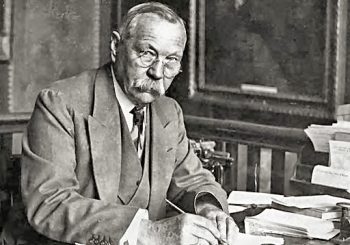 That I am guilty because ‘in ingratitude
That I am guilty because ‘in ingratitude
Sherlock, the sleuth-hound with motives ulterior,
Sneers at Poe’s Dupin as very “inferior”.’
Have you not learned, my esteemed commentator,
That the created is not the creator?
As the creator I’ve praised to satiety
Poe’s Monsieur Dupin, his skill and variety,
And have admitted that in my detective work.
And have admitted that in my detective work
I owe to my model a deal of selective work.
But is it not on the verge of inanity
To put down to me my creation’s crude vanity?
He, the reed, would scoff and sneer,
Where I, the creator, would bow and revere.
So please grip this fact with your cerebral tentacle:
The doll and its maker are never identical.
In Some Truths About Sherlock Holmes , Doyle complimented Poe and Gaboriau, and wanted to build upon them in writing mystery stories. Guiterman was an American in a snit.
DOYLE ON HOLMES
Some Truths About Sherlock Holmes
Some Personalia About Sherlock Holmes
A Gaudy Death

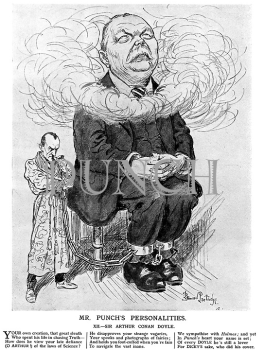 Bob Byrne’s ‘A (Black) Gat in the Hand’ made its Black Gate debut in 2018 and has returned every summer since.
Bob Byrne’s ‘A (Black) Gat in the Hand’ made its Black Gate debut in 2018 and has returned every summer since.
His ‘The Public Life of Sherlock Holmes’ column ran every Monday morning at Black Gate from March, 2014 through March, 2017. And he irregularly posts on Rex Stout’s gargantuan detective in ‘Nero Wolfe’s Brownstone.’ He is a member of the Praed Street Irregulars, founded www.SolarPons.com (the only website dedicated to the ‘Sherlock Holmes of Praed Street’) and blogs about Holmes and other mystery matters at Almost Holmes.
He organized Black Gate’s award-nominated ‘Discovering Robert E. Howard’ series, as well as the award-winning ‘Hither Came Conan’ series. Which is now part of THE DEFINITIVE guide to Conan. He also organized 2023’s ‘Talking Tolkien.’
He has contributed stories to The MX Book of New Sherlock Holmes Stories – Parts III, IV, V, VI, XXI, and XXXIII.
He has written introductions for Steeger Books, and appeared in several magazines, including Black Mask, Sherlock Holmes Mystery Magazine, The Strand Magazine, and Sherlock Magazine.
I always took Holmes’s comments on Dupin et cetera as backhanded compliments.
oh yeah – Doyle was a fan. It just fit Holmes’ prickly personality. Doyle picked two detectives he was a fan of to use.
Perhaps if Sir Doyle held himself more like Watson,
But thought more like Holmes when putting his socks on,
His reaction when someone assailed his redoubt,
Came because he felt greater the tweak to his snout.
Still, I can’t think of either man but inappropriate,
To air out all grievance to public novitiate.
Perhaps Conan Doyle could have Watson demur,
On Holmes’ grand opinions of self, as it were,
But shame, too, on Guitermann for having such bent,
As to frame vicious slur in fair compliment!
When Arthur at Arthur should resolve to tilt,
It shakes the foundations on which Camelot was built.
TL;DR: “WTH, guys?”
Nice!
Doyle sure could be prickly…
Thanks! Rhymed couplets are notoriously contagious.
Doyle certainly could be prickly. Laconte (“A Hobbit, A Wardrobe, and a Great War”) seemed to think that that was because of the emotional fallout from WWI, but I admit that my familiarity with Doyle’s personal timeline is not good enough to agree or disagree.